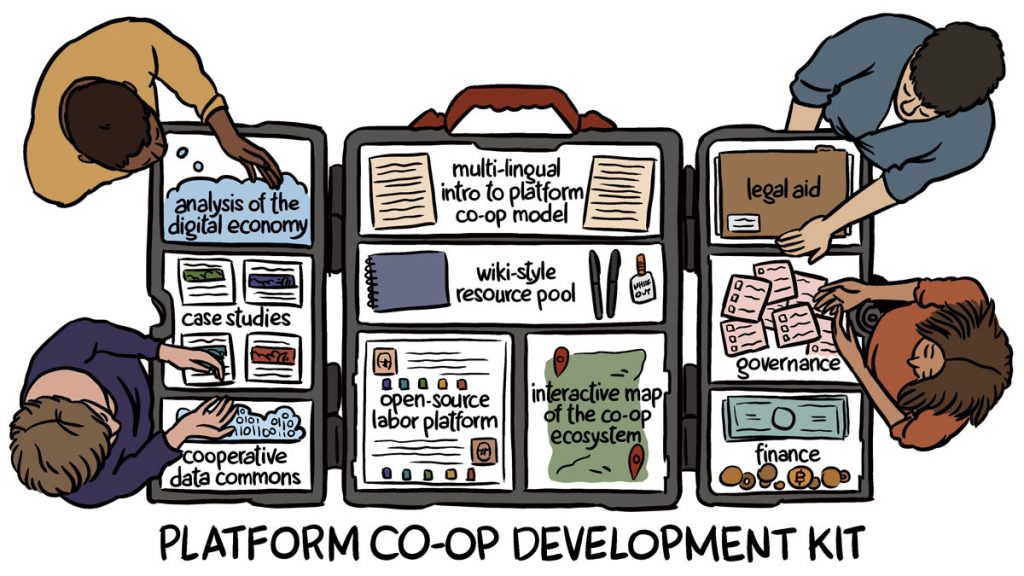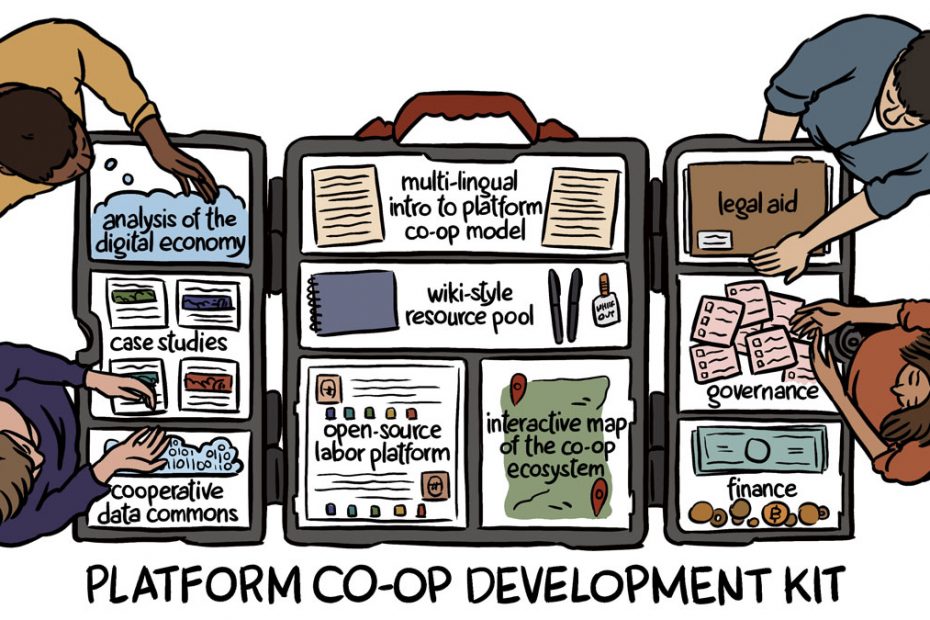It’s happened over and over again throughout history, since at least the 18th century: the Industry starts squeezing and mistreating its workers. The workers protest to change their lot, and when their protests fall on deaf ears, they build their own businesses as an alternative to employment with the Industry. (1)
The “sharing economy” (also known as the “gig economy”) has just hit the middle of that cycle. Once a promise for worker freedom and “work democratization”, its success on Wall Street has become its failed promise to gig workers. Gig work – whether it’s on Uber, AirBnB, TaskRabbit and yes, Etsy – has become a race-to-the-bottom for the hard-working entrepreneurs creating the value, while bringing in fortunes for the owners.
Researcher Palak Shah explains, “Workers in the on-demand economy tell us that they like the flexibility of their work, but they fear being cut off from their platforms without warning … [they] like the economic possibilities of these emerging sources of revenue, but instead found themselves being paid less than minimum wage.” (2)
So now the gig workers – drivers, photographers, crafters – are starting to form online cooperatives as an alternative.
Taking Cooperation Online: Platform Cooperativism
There is now a name to the rising interest in online cooperatives: platform cooperativism. Certainly existing cooperatives of all kinds have run websites and webstores for ages, such as REI.com, but platform cooperatives is the name used for intentional online-only co-ops.
“The essence of a platform cooperative is that it is owned and governed by the people who produce the product.”
– Juliet B. Schor, After the Gig
The ideas behind platform cooperativism represent a return to the original promise of flexibility, autonomy, and independent livelihoods for online workers. These ideas are explored and explained in the book Ours to Hack and to Own, a collection of 40 essays edited by Nathan Schneider and Trebor Scholz. In the essays, academics and thinkers expose the failures of the sharing economy, share lessons learned from the first online cooperatives, and propose solutions for a cooperative internet.
The organizers at Artisans Cooperative are carefully studying this book as we craft an online co-op marketplace for handmade goods. We’ve gleaned a lot of important ideas from the book that resonate with us as long-time gig workers for Etsy.
From the ideas presented in the book, we’ve made a list of platform cooperativism principles that we intend to incorporate into our governance and design. Happily, we believe these principles will also create a better online shopping experience for customers and artisans alike.

Bill of Rights for Online Workers: the Principles of Platform Cooperativism
These principles are like a “Bill of Rights” for online workers like handmade artisans.
Quotes come from Ours to Hack and to Own (2):
- Inclusion and input. The users of the platform should be involved with the design, from the very beginning.
- Earnings maximization for workers. Platforms on which workers can organize their own small enterprises (like artisan businesses) tend to generate higher levels of income for platform workers.
- Stability and predictability. Innovations in platform design can have a direct impact on people’s livelihoods. Minimize such volatility and give workers sufficient time or compensation to adjust to forthcoming changes.
- Transparency. Practice transparency on two levels: the platform algorithm itself (so workers understand how to increase their earnings) and archived data (so users of the platform understand how their personal data is being used).
- Portability of products and reputations. People working on platforms should be able to own the products of their work, including their product listings, customer relationships, and reviews / reputation histories.
- Upskilling. Connect people with pathways for learning new skills and advancement opportunities.
- Social connectedness. Enable and foster communities for today’s workers to exchange tips, connect, and build relationships with each other.
- Feedback mechanisms. Establish “ombudsman” services, equivalent of customer support for all users and workers.
- Convenient solidarity. Design needs to be convenient, focused on attracting people, and fulfilling its value proposition.
- Stewardship. Engage members so they become active stewards of the co-op, not passive participants.
- Removing economic barriers and enabling distributed ownership. One way is to make it relatively simple for a user to “multi-home”: be a provider on multiple platforms.
- Beyond “luxury cooperativism.” “The point, as cooperative advocates have come to realize, is not to create maximally pure alternatives that help a few escape an alienating system, it’s to take seriously a long-term project of actually transforming what counts as business as usual – in the direction of equity, democracy, solidarity, and sustainability.”
***
Conclusion
These are not just pie-in-the-sky ideals. Successful platform cooperatives are operating today using these principles, like the Drivers Cooperative (Uber alternative), Ampled (direct support for musicians), Stocksy (photography), and Resonate (music streaming).
We hope Artisans Cooperative will soon join their ranks as an alternative to Etsy for artisans, crafters, artists, and makers. The purpose of platform cooperativism is to solve gig workers problems, provide them with an alternative income, and empower their independent businesses to grow more.
Quoting essay writer Astra Taylor, who herself was quoting Elaine Brown: “One should never organize or mobilize around abstract principles. When the [Black] Panthers organized their free breakfast program, they didn’t say, ‘You have a right to nutrition’ – they fed people.” (1)
***
In our next post, we’ll be interviewing Professor Nathan Schneider to ask him what has changed since the book was published in 2017, and ask his advice for the Artisans Cooperative!
What are your responses and reactions to this piece? Have you read the book? Do you know of other successful platform cooperative case studies? Let us know your thoughts in the comments below!
Resources and Further Reading
Further Reading
(1) For All the People: Uncovering the Hidden History of Cooperation, Cooperative Movements, and Communalism. John Curl. 2012.
(2) Ours to Hack and to Own: The Rise of Platform Cooperativism, A New Vision for the Future of Work, and a Fairer Internet. Nathan Schneider and Trebor Scholz, editors. 2017.
A Brief List of Active Platform Cooperatives (2022)
- Stocksy: photography marketplace
- Fairmondo: cooperative marketplace competitor to Amazon based in Germany
- Snowdrift.coop: crowdmatching funds for public goods
- Resonate: cooperative music streaming service
- Ampled: direct support for musicians
- NYCREIC: New York City community real estate investment co-op
- Robin Hood Coop: a protocol library for long-volatility bias
- Savvy Cooperative: empowering people to use their patient experiences to improve health innovations
- Comradery: cooperatively-owned subscriber platform (similar to Patreon)
- Drivers Cooperative: a driver-owned ridehailing cooperative in New York City
***
About Artisans Cooperative: We are building an online handmade marketplace for an inclusive network of creatives. Join us today!

Pingback: Get Involved: Volunteers Needed | Artisans Cooperative
Pingback: Starting A Platform Cooperative: An Interview With Professor Nathan Schneider | Artisans Cooperative
Pingback: Handmade Marketplace Priorities Poll | Artisans Cooperative
Pingback: Our First Annual Report | Artisans Cooperative
Pingback: Marketplace Priorities Poll Results | Artisans Cooperative
Pingback: Presenting Our Marketplace Tech Plan | Artisans Cooperative
Pingback: Handmade Survey Results | Artisans Cooperative
Pingback: Presenting Our Handmade Policy | Artisans Cooperative
Pingback: Financial Expectations Survey (5 Min) | Artisans Cooperative
Pingback: Financial Survey Results | Artisans Cooperative
Pingback: The Report Button: Why, How, And When To Use It | Artisans Cooperative
Pingback: Cooperativa estimula mercado internacional de artesãos - MundoCoop - O Portal de Notícias do Cooperativismo